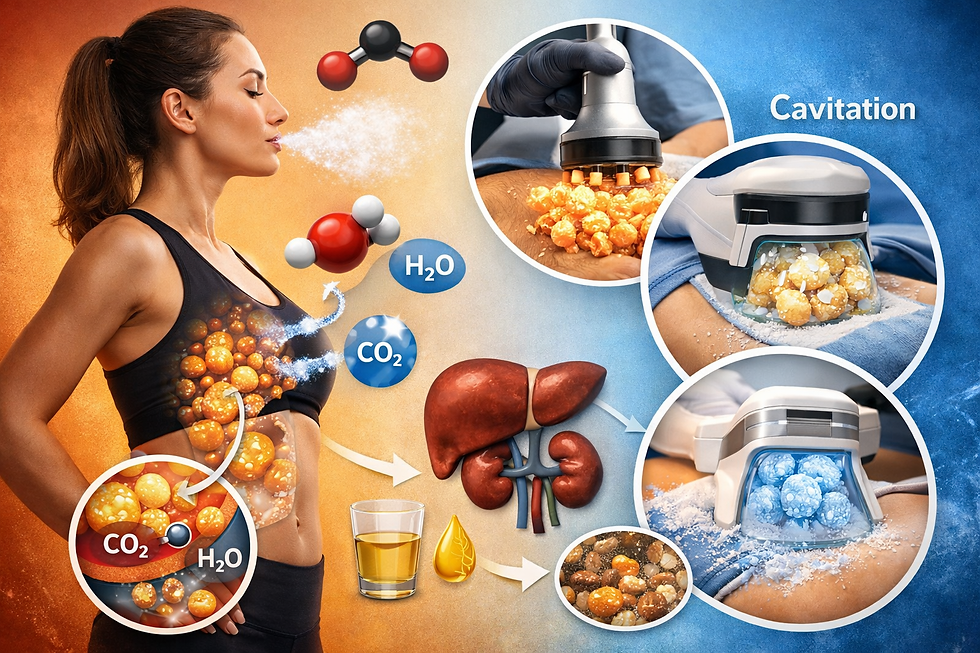Lipomas: What They Are, Why They Form, and the New Non-Surgical Way to Remove Them
- Dale

- Jul 15, 2025
- 4 min read
They’re soft, slow-growing, and often painless. Yet for many people, lipomas – benign fatty lumps under the skin – are more than just a minor curiosity. Whether it’s discomfort from clothing, frustration with their appearance, or the worry of an unexplained lump, lipomas can have a bigger impact than their size suggests.
But what exactly is a lipoma? Why do they appear? And what are the best options if you want one removed? As more people search for discreet, scar-free solutions, advanced clinics like Jayèn in Sussex are offering non-surgical alternatives that are attracting clients from across the UK and beyond.
What is a Lipoma?
A lipoma is a benign (non-cancerous) tumour made up of fatty tissue. It forms beneath the skin and often feels soft and slightly doughy to the touch.
Typical signs of a lipoma:
A soft, moveable lump under the skin
Usually painless unless pressing on nerves or blood vessels
Slow growth over months or years
Most common on the neck, shoulders, back, arms, or thighs
While they’re often small (2–5cm), some can grow larger. Lipomas can appear singly or as multiple lumps, a condition called multiple lipomatosis.
What Causes Lipomas?
The exact cause of lipomas isn’t fully understood, but several factors are thought to play a role:
Genetics
Lipomas often run in families. In rare cases, inherited conditions like familial multiple lipomatosis cause people to develop many lipomas over time.
Age
Most lipomas are found in adults between 40–60 years old, though they can appear at any age.
Trauma
Occasionally, people notice a lipoma forming after an injury. While not scientifically confirmed, some experts believe trauma may trigger fatty tissue growth.
Rare Disorders
Conditions like Dercum’s disease and Madelung’s disease are linked to multiple lipomas, though these are uncommon.
Are Lipomas Dangerous?
In most cases, no. Lipomas are benign and don’t turn into cancer. However, it’s always wise to see a GP or dermatologist to confirm the diagnosis, especially if:
The lump grows rapidly
It’s painful or tender
It feels hard or fixed in place
The skin over it changes colour or texture
These symptoms could suggest another type of growth that needs medical assessment.
Do Lipomas Go Away On Their Own?
Unfortunately, no. Lipomas don’t shrink with weight loss or disappear naturally over time. Once formed, they usually stay the same size or grow slowly.
For those who find them bothersome – physically or cosmetically – removal is the only option.
How Are Lipomas Removed?
1. Surgical Excision
The traditional approach involves making a small incision under local anaesthetic to cut out the lipoma.
✔ Advantages: Permanent removal, suitable for larger lipomas
❌ Disadvantages: Scarring, stitches, and recovery time
This method is still commonly used in NHS and private dermatology clinics.
2. Non-Surgical Lipoma Removal (HIFU)
A newer option involves using High-Intensity Focused Ultrasound (HIFU). At Jayèn Clinic in Sussex, this innovative approach has drawn clients from across the UK, the USA, and Australia seeking a non-invasive solution.
HIFU works by:
✅ Delivering ultrasound energy deep into the lipoma
✅ Heating and breaking down the fatty tissue
✅ Allowing the body to naturally reabsorb and eliminate the fat cells
Benefits of HIFU for lipomas:
No cuts or stitches
Minimal downtime
Scar-free – ideal for visible areas like arms or neck
This discreet, advanced treatment is only offered at a select few UK clinics.
What To Expect From HIFU Lipoma Treatment
Sessions typically last 30–60 minutes depending on the size and location of the lipoma. Most clients describe a sensation of warmth and tingling.
Results develop gradually over weeks as the treated fatty tissue is reabsorbed by the body. Larger or deeper lipomas may need more than one session.
Can Lipomas Come Back?
Once a lipoma has been successfully treated, it’s unlikely to return in the same location. However, people prone to lipomas may develop new ones elsewhere over time.
Regular self-checks and early consultations can help manage future growths.
Why Jayèn Clinic?
Jayèn Clinic has become a recognised name in advanced aesthetic treatments, with locations in Brighton & Hove, Eastbourne, and Hellingly & Hailsham. Their use of cutting-edge HIFU technology for lipomas has drawn international attention, with clients travelling from as far as Sydney and New York.
The clinic’s focus on discreet, spa-like care and minimal downtime makes it an attractive choice for those seeking alternatives to surgery.
FAQs
Can you shrink a lipoma naturally?
No. Lipomas don’t respond to diet, exercise, or home remedies. Professional treatment is the only effective option for removal.
Is non-surgical lipoma removal safe?
Yes – when performed by experienced specialists using approved technology. Jayèn Clinic requires a prior medical confirmation of diagnosis before treatment.
How long does non-surgical treatment take?
Most sessions last under an hour. Results appear over several weeks as your body naturally eliminates the treated fat cells.
How much does lipoma removal cost?
Pricing varies based on size, location, and the number of lipomas. A consultation at Jayèn will provide a tailored quote.

The Takeaway
Lipomas may be harmless, but they’re not always something you want to live with. Thanks to advances in aesthetic medicine, there are now discreet, non-surgical options for those seeking removal.
At clinics like Jayèn, technology such as HIFU is changing how we approach these fatty lumps – offering a scar-free solution for clients from Sussex to Sydney.











Comments